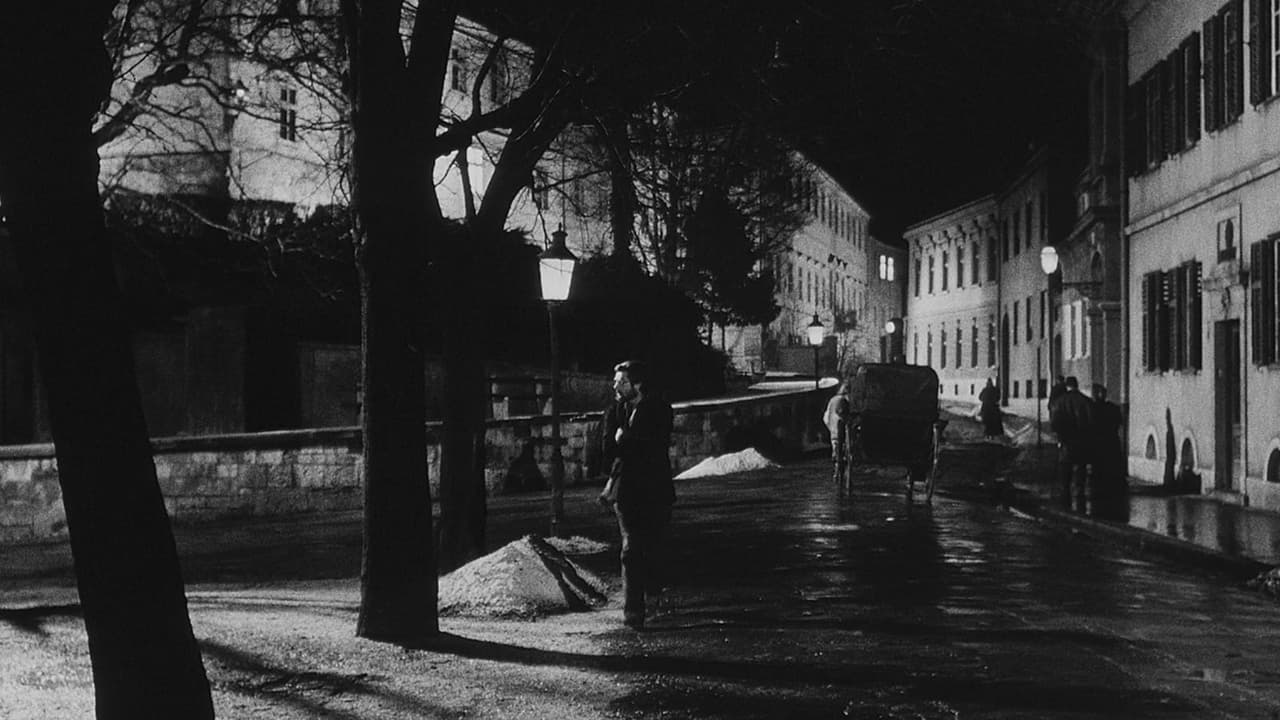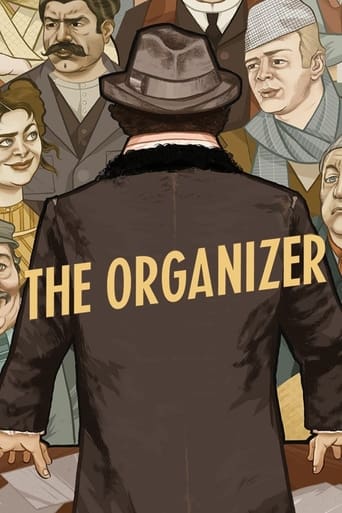



Really Surprised!
A Disappointing Continuation
a film so unique, intoxicating and bizarre that it not only demands another viewing, but is also forgivable as a satirical comedy where the jokes eventually take the back seat.
View MoreExcellent and certainly provocative... If nothing else, the film is a real conversation starter.
View MoreMario Monicelli was one of the successors to the neorealist movement in Italian cinema, which began in the mid-'40s and catapulted Italy to the forefront of international cinema. Following it came a generation of Italian filmmakers — including Fellini and Antonioni — who had apprenticed under the neorealist directors, and who kept Italian cinema alive for one more generation while the "big three" neorealists (Rossellini, De Sica, and Visconti) moved in increasingly disparate directions. Monicelli was one such filmmaker to emerge from the waning neorealist movement. His first big success, I believe, was the 1958 film, "Big Deal on Madonna Street", which is the first major film I know of from the commedia all'italiana genre ("comedy Italian style", taking its name from Pietro Germi's 1961 film, "Divorce Italian Style"). It's a wonderful comedy, and I'd recommend seeing it, if possible, before "The Organizer".Commedia all'italiana is generally characterized by a mixture of mildly over-the-top humor and a gentle poignancy that anchors what could otherwise be absurdist farce. There tend to be light political undertones which unobtrusively satirize contemporary life in Italy, and an emotional undercurrent that stems from a sympathy with likable characters who simply can't get a foothold in modern society.This all fits "Big Deal on Madonna Street" to a tee, but what about "The Organizer"? The film, released in 1963 and starring Marcello Mastroianni, has all the aforementioned qualities, but in smaller doses. It goes heavier on the drama, and lighter on the comedy, which is nearly always saturated with a pathos that exceeds what is typical of the commedia all'italiana genre. The resulting blend is sometimes uneven. There were times when I wasn't sure if something was supposed to be sad or funny. But I suppose there's no need for the two to be mutually exclusive, and there were other times where the humor and drama came together wonderfully. "The Organizer" is halfway between a standard commedia all'italiana film and a more traditional neorealist exercise like "Bicycle Thieves" or "Umberto D.". We can certainly see the neorealist influence all over the film, but we can also see Monicelli's own unique brand of comedic farce in this entertaining blend of cinematic styles. Monicelli was a lifelong Marxist and communist. Other than the apolitical Fellini, and perhaps Rossellini, whose politics are still a bit of an enigma to me, Italian cinema was filled with Marxist thinkers and self-proclaimed communists: Visconti, Pasolini, De Sica, Antonioni, Rosi, Bertolucci, Pontecorvo, and Monicelli. In fact, cinema in general has been filled with them: Godard, Gorin, Marker, Varda, Fassbinder, Ôshima, Eisenstein, Kalatozov, et cetera. More narrow-minded American viewers will need to be reminded that communism did not have the terrible connotation in Europe in the '60s that it has in America today. McCarthy did his job well in demonizing communism for Americans, but being a communist in Europe in those days was simply about politically engaged individuals seeking to rectify the social injustice they saw all around them. Today we associate it with tyranny and Stalinism, but that is very far from the reality of communism for Europeans who embraced it during the era in which "The Organizer" was made. Communism was simply a natural and inevitable response for countries like France and Italy, who had recently seen the other end of the political spectrum up close and personal. Americans have always been the quickest to scoff at communism, partly because we live in the capitalist center of the world, but also because, here on the other side of the Atlantic, we've been largely spared the ugliness of fascism (although McCarthy certainly gave us a glimpse).The reason I delve into such contentious territory — something I would normally prefer to avoid — is because "The Organizer" is a plainly Marxist film, brazen in its declaration of political rights and wrongs, as those who discuss politics will almost invariably be. If your political compass is locked in a fixed anti-communist position, you will likely be unable to enjoy this film, which would be a shame, because there's a lot to enjoy here if you can set politics aside. I'm not political by nature, so I've never had any issue doing that. I respect the prerogative of filmmakers to express their ideas, even ones I don't agree with (in fact, those are often the perspectives I find I learn the most from), and so political cinema — of any variety — is always welcome on my television. Overall, however, "The Organizer" is actually relatively unbiased, compared to many other exercises in left-wing cinema. Monicelli calls it a Marxist film, and it most certainly is, but it's Marxist in the humanist sense as much as it is in the communist sense. There is, of course, a deep sympathy with the working class, and that, on the whole, is the dominant tone of the film: sympathy. It's not so much the angry revolutionary mode of filmmaking that we see from, say, Godard in the early '70s. It's based much more in an empathy for human suffering, and a desire to see despairing individuals liberated from the prison walls created by their social class. This desire, after all, was the core of communism, before it was bastardized by Stalin."The Organizer" is an insightful film about the complexities and moral dilemmas surrounding revolution, and while I prefer less biased reflections on the subject, such as Fellini's "Orchestra Rehearsal", Herzog's "Even Dwarfs Started Small", or Tarr's "Werckmeister Harmonies", Monicelli does a respectable job of observing the obstacles that stand in the way of the revolutionary process. He is committed to a specific ideology, without question, but this is not by any means mindless propaganda. This is a high quality film that works both as a dramatic contemplation on the nature of revolution, and as a comedy based in lighthearted entertainment. Enjoy it on whichever level you prefer.RATING: 8.00 out of 10 stars
View MoreThe difference between this film and a lot of other strike/union related films, is that it has a sense of humor and is not taken with its own self importance. As a matter a fact, the film is quite measured and cautious in its outlook. There are no heroics here, everybody is a full fledged human being with his/her weaknesses and strengths. Mastroianni is particularly wonderful here in a very nuanced performance, where he goes from nebbish professor to inspirational and powerful leader in matters of seconds. The script is very strong and Rotunno's cinematography is excellent. Monicelli injects the film with so many details that hit their mark, that he has gone from a very good director to a great one in my estimation. The early scenes at the factory are truly remarkable in a uniquely cinematic way. They hardly contain any dialogue and put you in the workers place in a remarkably efficient way.Highly recommended.
View MoreEarnest, as 1 commentator said? Yes. Depressing, as the same commentator said? No, no, no. It's realistic, showing what was and too often is, not upbeat with false hopes for the future, except that the perseverance of the title character is upbeat. The Organizer is one of the best, perhaps the best, movie about union organizing that I can recall. As is often the case, Mastroianni's acting is different from any other role he has played. The same is true of Salvatori and Girardot. The movie itself is far superior to director Monicelli's Big Deal on Madonna Street, which doesn't really hold up today. I saw The Organizer when it first came out in the US and later on VHS. A DVD is long overdue.
View MoreThe struggle of the working class for shorter hours and better conditions in a Torino textile factory is well portrayed in this somewhat depressing film.....depressing because in many parts of the world the confrontation between management and workers has still not been resolved. The introduction of scab labour to replace striking workers brings the film to a dramatic climax.It's a splendid cast with believable characters giving us both sides of the eternal argument. Is a 14 hour day with half hour lunch break asking too much of workers? This is a film of great atmosphere created by the factory sets and the continual thrashing noise of the looms. When the factory whistle blows at 8 PM you share the joy and relief of the workers after a hard day. This is a documentary type drama to be seen, to be believed and to be remembered for we know that these workers and others like them put their jobs on the line for conditions that we now enjoy to-day.
View More